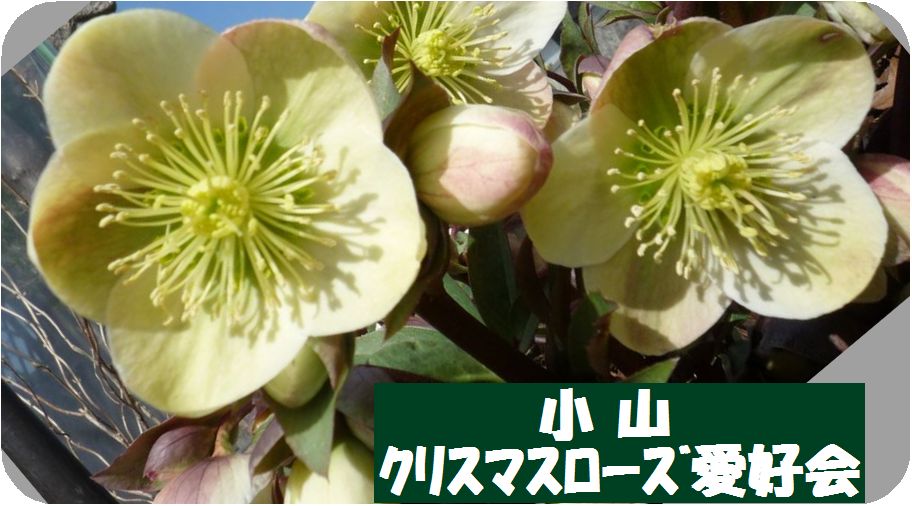< Christmasrose in January >

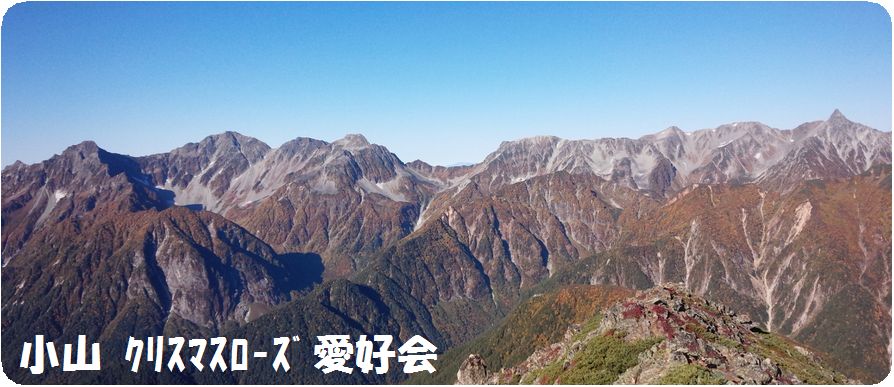
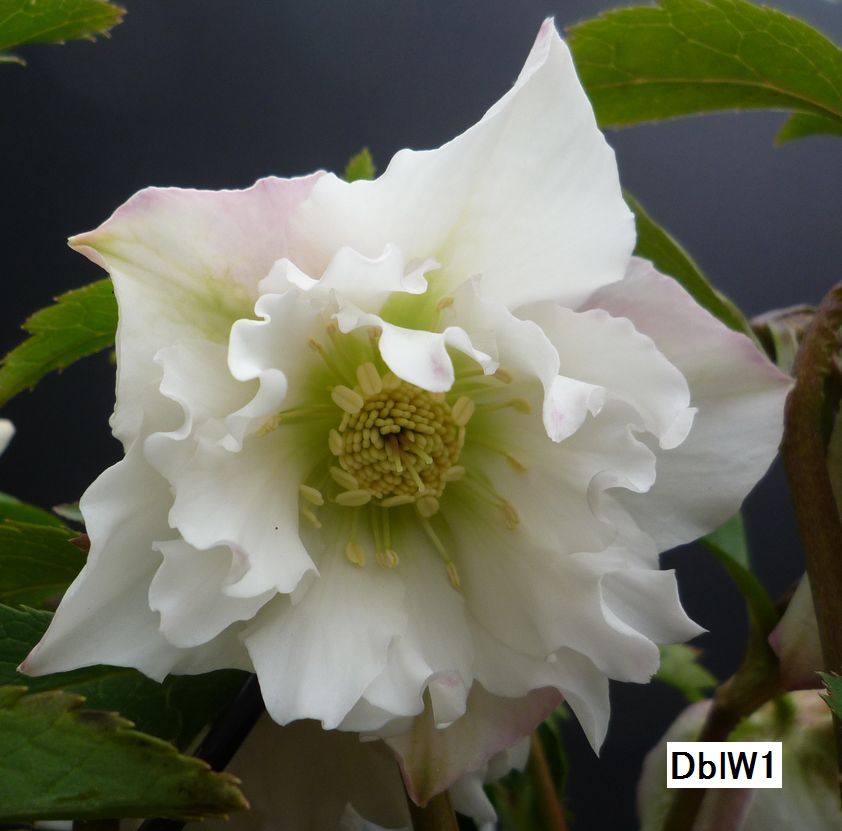
In January, the flower buds grow larger and the flower stalks grow
little by little. If you haven't cut off the old leaves yet, cut them off
as soon as possible to give the flower buds plenty of sunlight.
As the flowering season approaches, we will give fertilizer mainly containing
phosphoric acid.
* Management of potted plants in January
Place the potted plants in a sunny place where it isn't exposed to cold
wind.
When the potted soil is dry, water the potted plants abundantly in the
morning. To equalize the temperature inside the pot, occasionally
rotate the pot so that the sunlight hits the pot evenly.
* Management of garden plants in January
No watering or fertilizer is required.
Withered and dirty leaves around the plant should be cut off again and
the mulching of fallen leaves should be inspected and adjusted.
< Christmasrose in February >
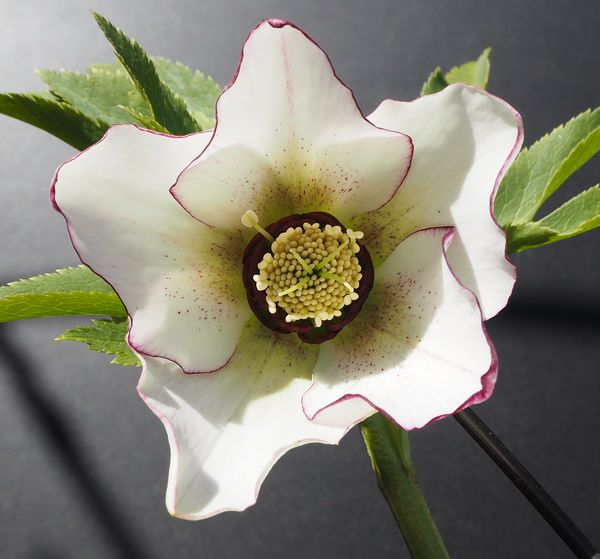

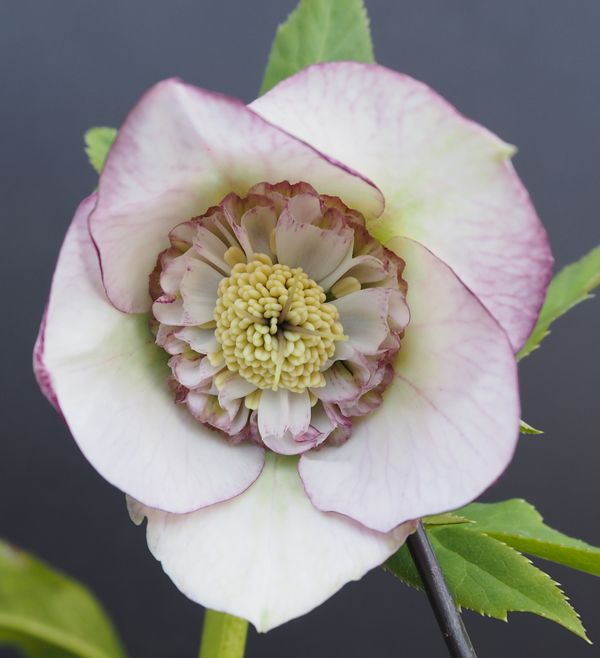
February is the coldest month of the year.
It depends on the year, but the early plants will start flowering
in the middle to the end of the month.
You may be surprised to see the flower neck drooping on a cold morning.
This is because the stems have less moisture to protect themselves
from the low temperatures at night, so you don't worried.
When sunlight hits the flower stalk, the stalk rises at an
astonishing speed.
From February to March, Christmasrose exhibitions and sales events are
held in various places, and you can see flowers of various colors and
variations. This is a great opportunity to expand your collection.
* Management of potted plants in February
You'd better continue to give fertilizer containing a lot of phosphoric
acid until March. February is the time when nutrients are needed for
flowering, fruiting, and growth.
Give the leaves and pot as much sunlight as possible.
Occasionally rotate the pot to equalize the temperature inside the pot
so that the sunlight hits the pot evenly.
The air will be dry, so be careful not to drain the water.
* Management of garden plants in February
No special watering or fertilizer is required.
When the stock base is covered with mulch, you'd better expose the flower
buds to the sunlight.
< Christmasrose in March >
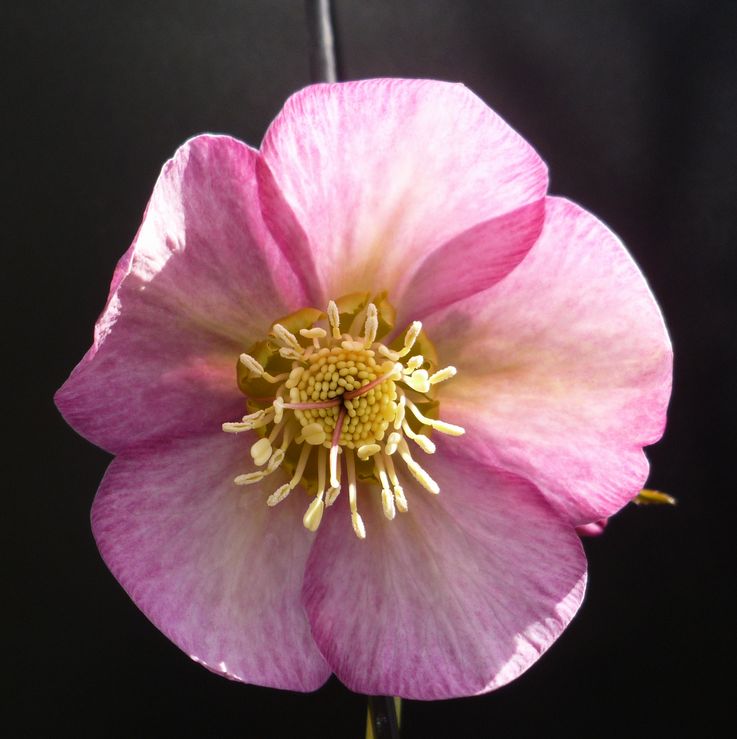

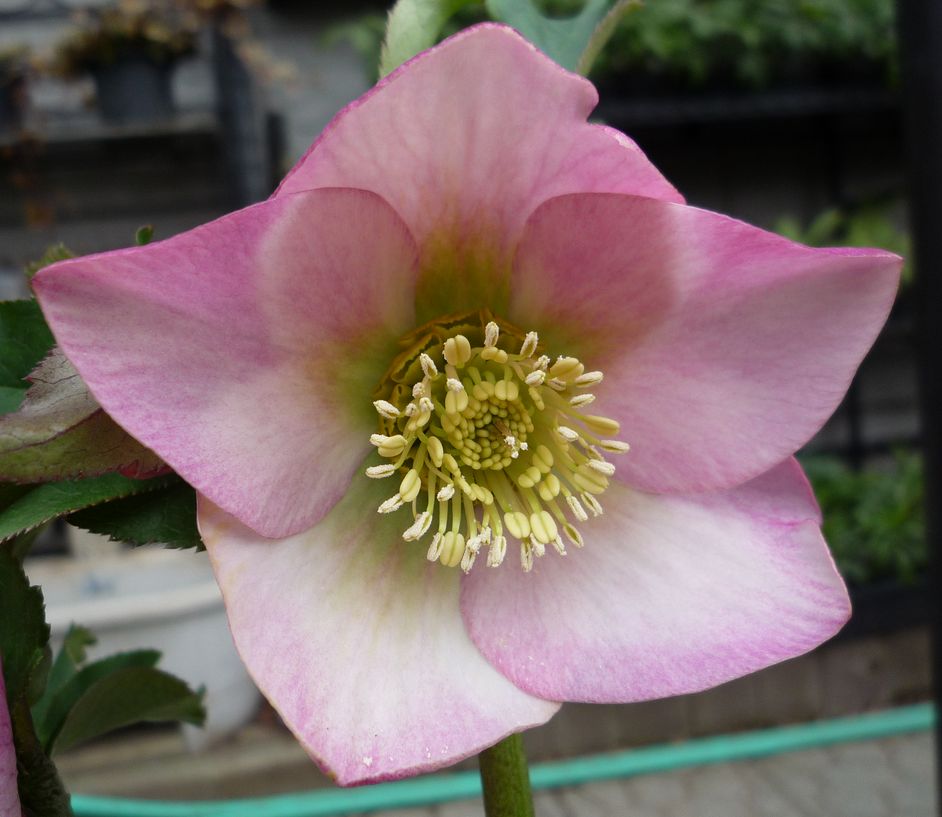
March is the season for Christmasroses, and all the Christmasrose
flowers are in full bloom.
This is the season when the growers are most productive and can feel
the joy of spring and the results of the year's work.
Flowers that have pods must be picked so that the stocks are weakened.
But you can pick only the pods in a flower to leave the petals.
March is the season for repotting along with autumn.
You can plant in a pot or in the ground, but you'd better plant without
breaking the root ball too much.
From late March to April, new leaves begin to grow vigorously.
These young leaves will help growing the next year's flowers, so handle
them with care.
* Management of potted plants in March
Give fertilizer with a lot of phosphoric acid and potassium.
Give the leaves and pot as much sunlight as possible, so that the sun
hits the pot evenly.
When the new leaves grow out, it is easy to run out of water, so water
it until it comes out from the bottom of the pot.
* Management of garden plants in March
Give slow-release fertilizer (such as organic fertilizer).
It can be considered in the garden that the selection of the planting place
should be done carefully considering the summer sun, etc.
< Christmasrose in April >
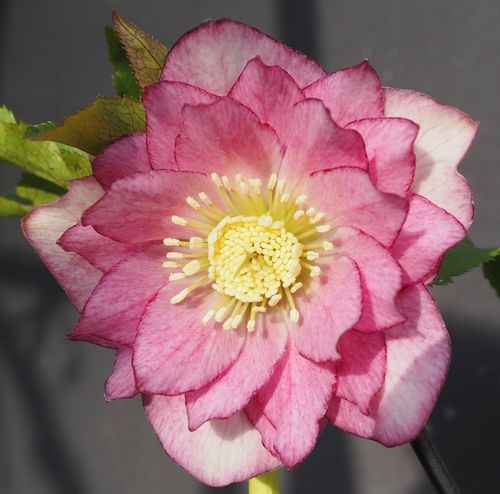

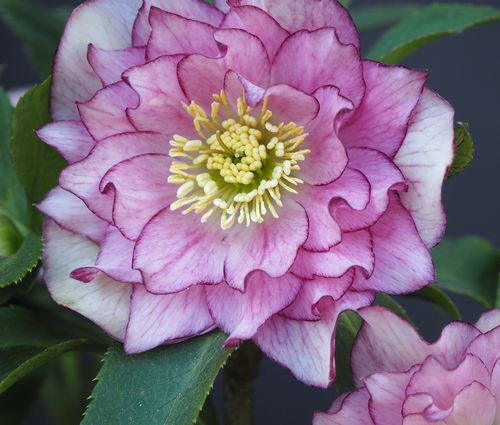
In April, the color of the petals fades as the temperature rises. At the
same time, new leaves grow vigorously.
By mid-April, choose a sunny day and cut off the flower stalks that have
finished flowering, leaving 2 to 3 cm from the ground to promote the
growth of new leaves. Cut and decorate beautiful flowers.
Fertilizers are given with equal amounts of 3 ingredients, but in late
May, adjust the amount so that the fertilizer is gone.
No repotting will be done in April.
* Management of potted plants in April
Give a fertilizer that contains the three ingredients evenly.
Do not replant.
Cut flower stalks early to encourage new leaf growth.
Get as much sunlight as possible. Avoid the afternoon sun.
If there is not enough water, the new leaves will quickly wilt, so water
the plant thoroughly until it comes out of the bottom of the pot.
* Management of garden plants in April
No special watering or fertilizer is required.
Don't replant.
Cut flower stalks early to encourage new leaf growth.
< Christmasrose in May >
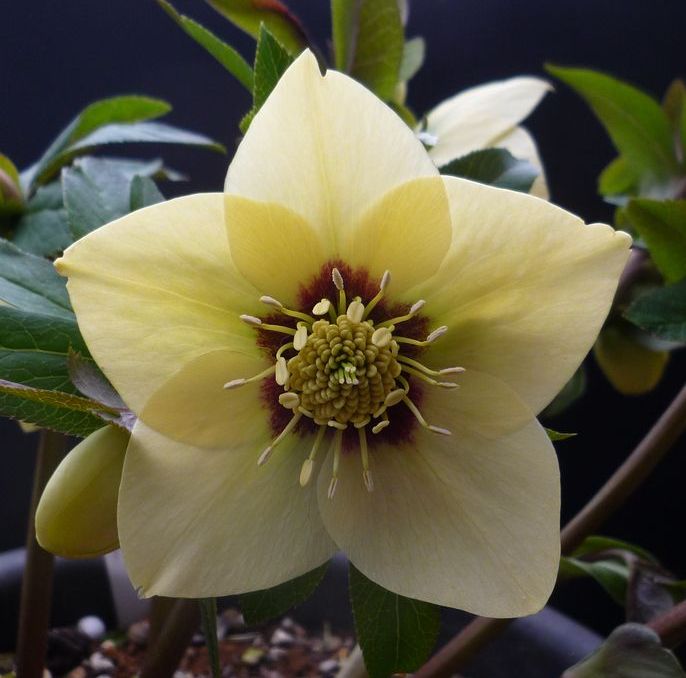

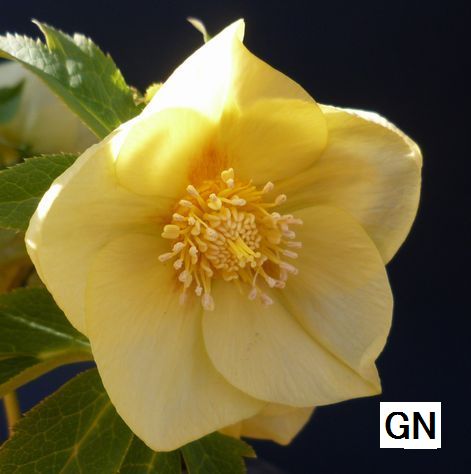
The flowers that have pleasing the eye for so long will also end. As the
temperature rises, the season to enter semi-dormancy is approaching.
Cut off the leftover flower stalks and old leaves as soon as possible
and clean the surroundings of the stock. Leave only the leaves that came
out after autumn last year.
Fertilizer is not required from this month to September. Please note
that if the fertilizer component remains, it may cause root rot in the
summer.
Even if it rains, the large leaves act as umbrellas and often prevent
water from spreading through the soil in the pot, so be careful when
watering.
* Management of potted plants in May
Do not fertilize and replant.
The new leaves are exposed to sufficient sunlight to enhance the stock,
but if the sunlight is strong, the new leaves should be protected from
sunburn with a shading curtain or the like.
If there is not enough water, the new leaves will quickly wilt, so water
the plant thoroughly until it comes out of the bottom of the pot.
* Management of garden plants in May
No watering or fertilizer required. Don't replant.
If the sun is strong, use a shading curtain to prevent sunburn on the
new leaves.
In preparation for the long rainy season, improve the drainage around
the plant.
< Christmasrose in June >
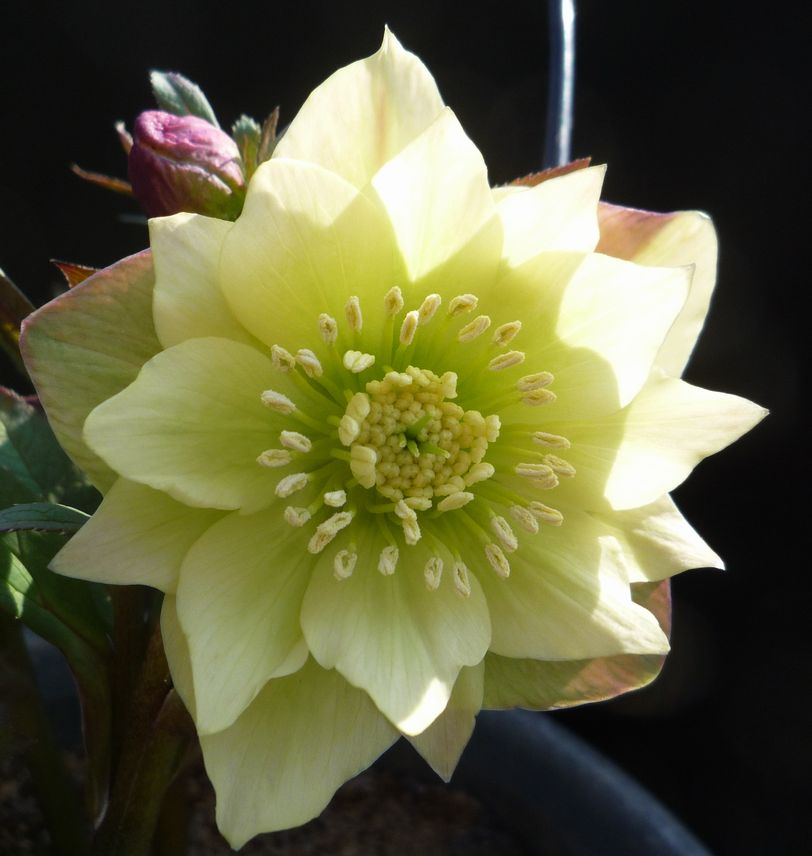

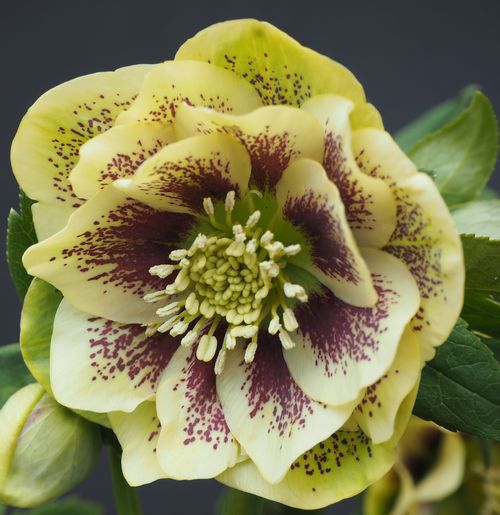
From June to September, the temperature and humidity are high, and the
European-born Christmas roses have a hard time. Let's do our best to
make it as comfortable as possible.
The stems after cutting the leaves and flower stalks will naturally rot
around this time, so remove them all and keep the stock base clean. Also
remove weeds.
Don't put the pot directly on the concrete, and make a gap in the bottom
of the pot to improve ventilation.
* Management of potted plants in June
Fertilizers and planting are prohibited.
Place under the eaves to avoid long rains during the rainy season.
The bottom of the pot should be well ventilated and should not be placed
directly on the ground.
Pay attention to moisture management in the pot to prevent root rot in
high humidity.
* Management of garden plants in June
Fertilizers and planting are prohibited.
In preparation for the long rains of the rainy season, improve drainage
and ventilation around the stocks, and frequently remove weeds.
< Christmasrose in July >
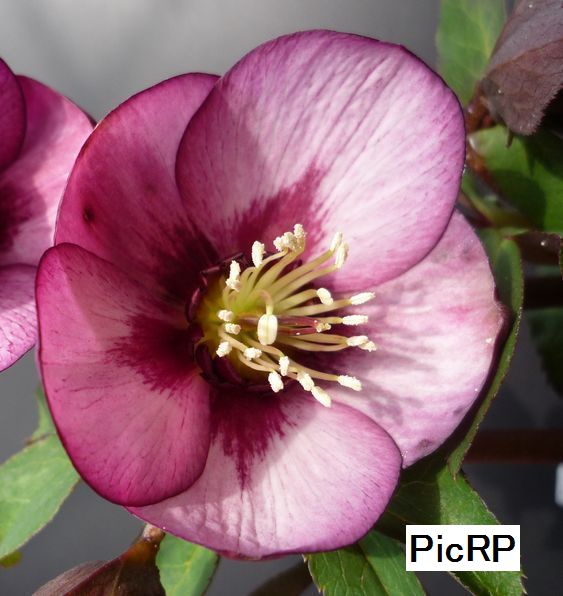

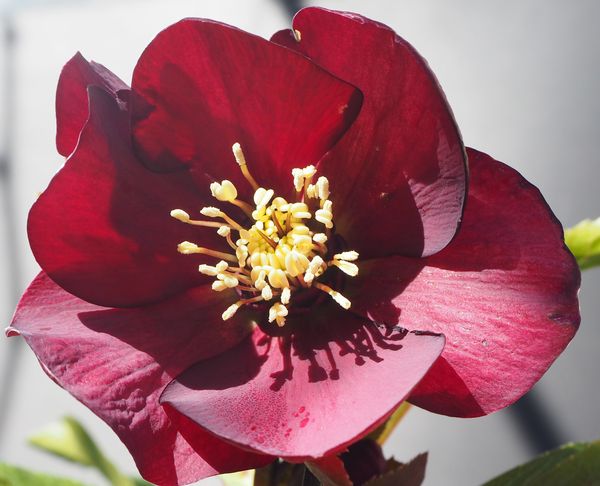
When the rainy season ends and summer begins, it is the most difficult
season for growing Christmasroses. The roots are dormant and just
breathing.
In the hot summer, avoid placing Christmasroses in direct sunlight and
use reed screens or blackout nets to create a cool environment as much
as possible.
Summer watering should focus on lowering the temperature in the pot,
starting in the evening when the sun is out, and watering until it runs
out of the bottom of the pot. Sprinkle water on the surrounding area and
use the vaporization heat when the water evaporates.
* Management of potted plants in July
Place in a cool place out of direct sunlight and make a gap in the bottom
of the pot.
Fertilizers and planting are prohibited.
Immediately after the rainy season, pay attention to the moisture
management in the pot so as not to cause root rot in the high temperature .
Water only in the evening and take the interval and manage it slightly
dry.
* Management of garden plants in July
Fertilizers and planting are prohibited. Watering is not particularly
necessary, but when the leaf stems lie down and spread out, water them
thoroughly in the evening.
Pull out weeds around the plants diligently to improve ventilation.
After the rainy season is over, if plants are exposed to direct sunlight
or the afternoon sun, use reed screens or shade nets to shade the area.
< Christmasrose in August >
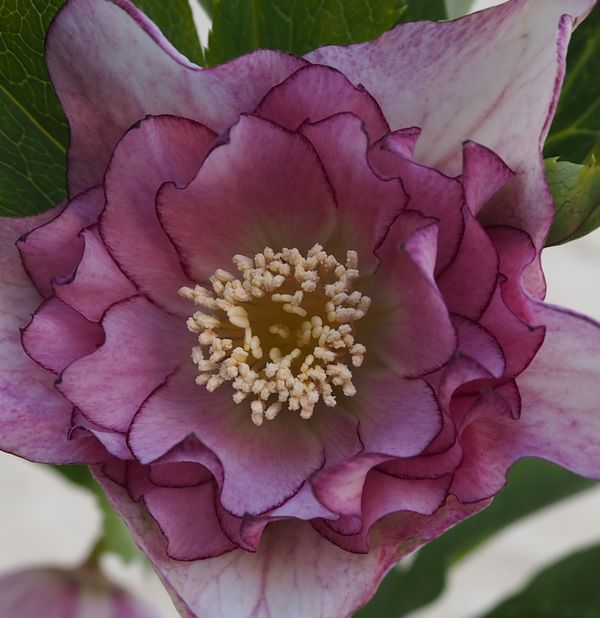


From August to September, it is the flower bud formation period, and
small rice grain-like flower buds are formed at the base of the stem.
Be careful not to let it get too dry. Avoid placing the Christmasroses
in direct sunlight, and use reed screens or blackout nets to create a
cool environment as much as possible.
Summer watering should focus on lowering the temperature in the pot,
water until it runs out of the bottom of the pot, in the evening, after
the sun has gone down.
Use the heat of vaporization when water evaporates to keep the growing
environment cool.
* Management of potted plants in August
Place in a cool place out of direct sunlight and make a gap in the bottom
of the pot.
Fertilizers and planting are prohibited. Water only in the evening, open
the interval and manage it slightly dry. Management to prevent root rot
is important.
* Management of garden plants in August
Fertilizers and planting are prohibited. Watering is not particularly
necessary, but when the leaf stems lie down and spread out, water
thoroughly in the evening.
Pull out weeds around the plant diligently to improve ventilation.
If plants are exposed to direct sunlight or the afternoon sun, use reed
screens or shade nets to shade the area.
< Christmasrose in September >



By the time the autumn wind blows, the seedlings will begin to grow new
leaves, and the flowering stocks will embrace new flower buds, welcoming
the suitable season for growing.
Flower buds (red pointy buds at the base of the stem) that will bloom
next spring are completed at the base of the stock that bloomed the
previous year.
However, if you cut off the leaves or apply too much fertilizer when the
temperature is still high, the flower buds may change into leaf buds,
so be careful.
Watering is given throughout September, in the evening same as in summer.
* Management of potted plants in September
Place in a cool place out of direct sunlight and make a gap in the
bottom of the pot.
Water only in the evening. Open the interval and manage it slightly dry.
Replanting can be done from the middle of this month, but if the days
with high temperatures continue, postpone it a little later.
Do not fertilize yet.
* Management of garden plants in September
Replanting can be done from the middle of this month, but if the days
with high temperatures continue, postpone it a little later.
Do not fertilize yet.
If plants are exposed to direct sunlight or the afternoon sun, use reed
screens or shade nets to shade the area.
< Christmasrose in October >
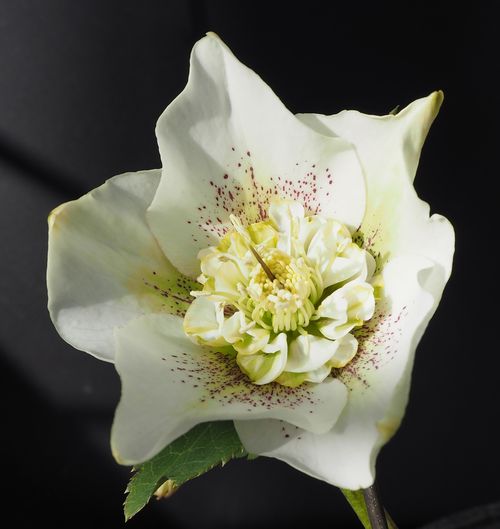

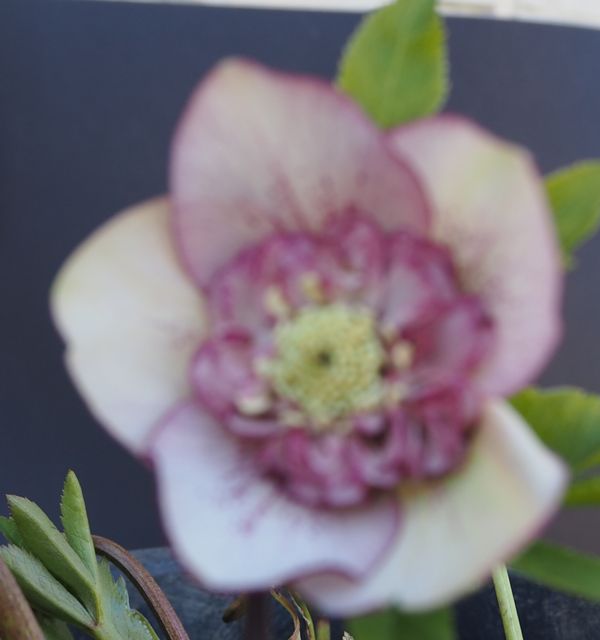
In October, the plants will start to grow vigorously, so give enough
sunlight to the seedlings and stocks, open the space between the stocks
to improve ventilation, and take care so that the leaves grow healthy.
October is the best time to do everything: repotting, fertilizing,
seeding, dividing.
After October, water in the morning.
In the early and middle of this month, the growth will become active,
so give slow-release solid fertilizer. Apply liquid fertilizer (5:10:5,
etc.) to the seedlings once every 10 days, diluting it 1000 times.
Due to daily irrigation and rain, the soil at the base of the stock may
come off and the stock may appear to float. If you cover it with new soil
to hide the roots, new roots will grow from the base of the plant and it
will regain its vitality. Watch carefully when repotting.
* Management of potted plants in October
Move the pot to a sunny location.
It is the right time for repotting and dividing (plants experienced
flowering 3 times or more).
Give slow-release solid fertilizer (oil meal + bone meal), 2 for a 18cm
pot, 3 for a 21cm pot, and 4 for a 24cm pot.
* Management of garden plants in October
The plants that were shaded by reed screens or shading nets should be
removed to allow more sunlight.
It is the right time for planting.
Give slow-release fertilizer (oil cake + bone meal). Fertilizer with a
lot of phosphoric acid is the main ingredient.
< Christmasrose in November >
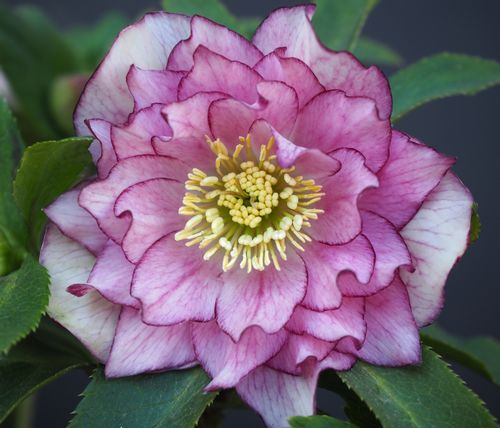

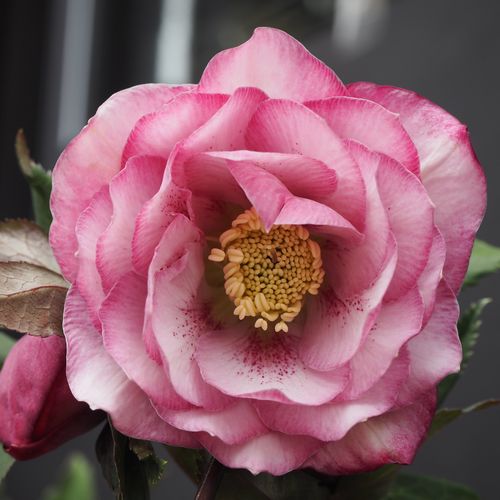
As the temperature drops, the flower buds formed at the base of the
leaves in the summer grow and prepare to extend the stem. As a result,
the spring leaves fall outward.
In order to enhance flower buds, give a slow-release fertilizer or
liquid fertilizer with a high amount of phosphoric acid (5:10:5) on a
regular basis.
In order to protect the flower buds from the cold, it is effective to
prevent frost and dryness by laying layers of bark or fallen leaves
around the base of the plant.
When the wind blows, the air becomes dry, so care must be taken to dry
the topsoil of potted plants.
After October, water in the morning.
This month is the perfect time to start making compost. Rice bran is
added to fallen leaves, and nitrogen-rich liquid fertilizer (500 times)
is sprinkled instead of water, and the leaves are tightly packed in
hemp bags.
* Management of potted plants in November
Rotate the pots occasionally until March to even out the temperature
inside the pots so that the sun hits the pots evenly.
* Management of garden plants in November
Flowering stocks that have been flowering for 3 years or more should be
covered with fallen leaves or straw to protect them from snow and cold
wind.
No fertilizer or water is required.
< Christmasrose in December >
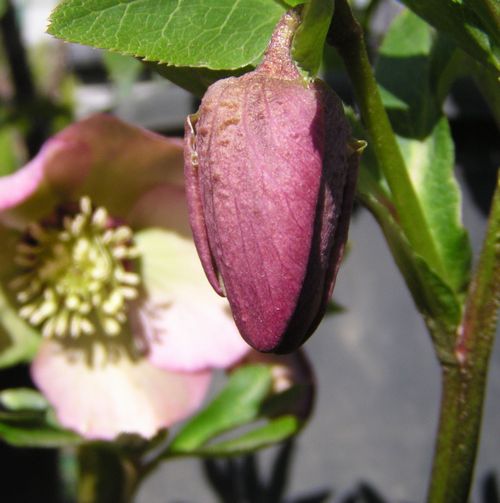

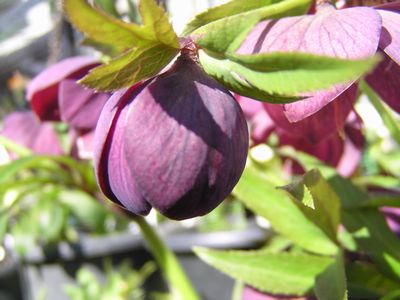
Watering during the cold season should be done in the morning on a
sunny day.
As for the fertilizer, the flowering stocks that have been flowering for
three years or more should be given a slow-release fertilizer with a
high phosphorus content, and the seedlings should be given a liquid
fertilizer containing the three components equally.
For flowering stocks that have been blooming for three years or more,
cut off all the leaves from the ground in spring and expose the base of
the stock to sunlight to enhance flower buds. Seedlings trim only the
old lower leaves.
During this time it is important not to overprotect stocks against the
winter cold. Stocks exposed to cold air and low temperatures will bloom
splendid flowers next spring.
The litter compost packed in November will stop the fever in a month.
Add water and repack into another jute bag for oxygen supply and uniform
ripeness.
* Management of potted plants in December
Occasionally rotate the pot to equalize the temperature inside the pot
so that the sunlight hits the pot evenly.
For flowering plants that have been growing for three years or more, the
leaves that emerge in spring are cut off from the base of the plant so
that the sunlight hits the base of the plant.
* Management of garden plants in December
For flowering plants that have been growing for three years or more, cut
off the leaves from the ground in spring and cover the plant base with
fallen leaves or straw to protect the plant from snow and cold winds.
If rain or melted snow accumulates on the leaf buds and flower buds of
the plant base, the flower buds will rot, so pay attention to drainage.
No fertilizer or water is required.
